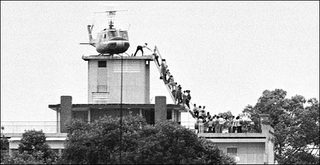
Few Iraqis Are Gaining U.S. Sanctuary
By SABRINA TAVERNISE and ROBERT F. WORTH
Published: January 2, 2007
BAGHDAD, Jan. 1 — With thousands of Iraqis desperately fleeing this country every day, advocates for refugees, and even some American officials, say there is an urgent need to allow more Iraqi refugees into the United States.
Until recently the Bush administration had planned to resettle just 500 Iraqis this year, a mere fraction of the tens of thousands of Iraqis who are now believed to be fleeing their country each month. State Department officials say they are open to admitting larger numbers, but are limited by a cumbersome and poorly financed United Nations referral system.
“We’re not even meeting our basic obligation to the Iraqis who’ve been imperiled because they worked for the U.S. government,” said Kirk W. Johnson, who worked for the United States Agency for International Development in Falluja in 2005. “We could not have functioned without their hard work, and it’s shameful that we’ve nothing to offer them in their bleakest hour.”
Senator Edward M. Kennedy, a Massachusetts Democrat who is taking over the immigration, border security and refugee subcommittee, plans hearings this month on America’s responsibility to help vulnerable Iraqis. An estimated 1.8 million Iraqis are living outside Iraq. The pace of the exodus has quickened significantly in the past nine months.
Some critics say the Bush administration has been reluctant to create a significant refugee program because to do so would be tantamount to conceding failure in Iraq. They say a major change in policy could happen only as part of a broader White House shift on Iraq.
“I don’t know of anyone inside the administration who sees this as a priority area,” said Lavinia Limón, president of the United States Committee for Refugees and Immigrants, a nongovernmental refugee resettlement agency based in Washington. “If you think you’re winning, you think they’re going to go back soon.”
For Iraqis, a tie to the United States is a life-threatening liability, particularly in harder-line Sunni neighborhoods. In 2003, Laith, an Army interpreter who would allow only his first name to be used, got a note threatening his family if he did not quit his job. His neighborhood, Adhamiya, was full of Baath Party loyalists. A month later, his father opened the door to a stranger, who shot him dead.
Laith’s mother begged him to stop working, but his salary, $700 a month at the time, supported the entire family. Then someone threw a sound grenade at the house. Graffiti appeared on a wall in ugly black paint accusing Laith of selling information about insurgents to the military. Laith and his family moved out of the house. Soon after, it was broken into and photographs of him with American soldiers were found in a family photo album.
“They know me,” he said, sitting in one of Baghdad’s hotels, because his family would not allow a Western reporter inside the house. “They know when I come and go.”
Many Iraqis who worked for Americans have already fled the capital or the country, and many plead for help or asylum on a daily basis. Of some 40 nationalities seeking asylum in European countries in the first half of 2006, Iraqis ranked first with more than 8,100 applications, according to the United Nations.
Remarkably few apply for refugee status in the United States, mainly because most Iraqis, even those who have worked for the United States government here, simply assume that getting American status is all but impossible. Iraqis cannot apply directly for refugee status in the American Embassy in Baghdad.
Another interpreter, Amar, who did not want his full name used, went to at least 10 embassies during a trip to Jordan last fall, but found only blank faces. He counts his sacrifice for America in bones and skin. He is missing a finger, an eye and part of his skull, after a large bomb exploded next to his Humvee last year. He has received two threats to his life. Two bodyguards accompany him everywhere. He stays in three different houses to confuse potential attackers.
There will be no reeducation camps in Sadr's Iraq.
Because it's not just the Sunnis watching.
If these people are not evacuated to the US, they and their families will be murdered
No comments:
Post a Comment